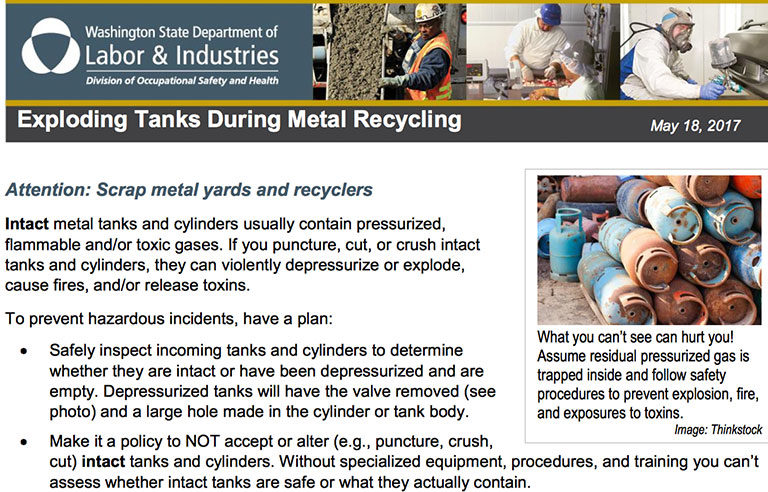Washington L&I issues hazard alert on metal tank recycling

Tumwater, WA – The Washington State Department of Labor & Industries has released a hazard alert warning of the dangers of exploding tanks during metal recycling.
In the alert, issued May 18, Washington L&I notes that metal tanks and cylinders may not be fully purged of their contents – intact tanks typically contain residual pressurized, flammable and/or toxic gases. Puncturing, cutting or crushing intact tanks or cylinders may result in depressurization or explosions, triggering fires or toxin releases, the alert states.
The bulletin offers the following tips for scrap metal yard workers and recycling center workers:
- Safely inspect incoming tanks and cylinders, assessing whether they are intact or have been depressurized and emptied. (Depressurized tanks will feature removed valves and large holes in the cylinder or tank body.)
- Make a policy to not accept intact tanks and cylinders, nor to puncture, crush or cut them. Also, assess the safety of intact tanks and determine their contents.
- Create safety procedures to verify cylinder contents before they are drained and ventilated. Depressurized tanks and cylinders still may contain toxic liquid residue.
- Survey the worksite for any intact tanks and cylinders that already may have been accepted. Be mindful of those that may be attached to vehicles or other incoming scrap.
- Implement reporting procedures to ensure response contractors or other trained services safely can isolate and remove intact tanks and cylinders.
The hazard alert also includes a link to a cylinder safety video from the Institute of Scrap Recycling Industries.
According to data from the Bureau of Labor Statistics, pressurized containers were the primary cause of 18 workplace fatalities in 2015.
Post a comment to this article
Safety+Health welcomes comments that promote respectful dialogue. Please stay on topic. Comments that contain personal attacks, profanity or abusive language – or those aggressively promoting products or services – will be removed. We reserve the right to determine which comments violate our comment policy. (Anonymous comments are welcome; merely skip the “name” field in the comment box. An email address is required but will not be included with your comment.)

